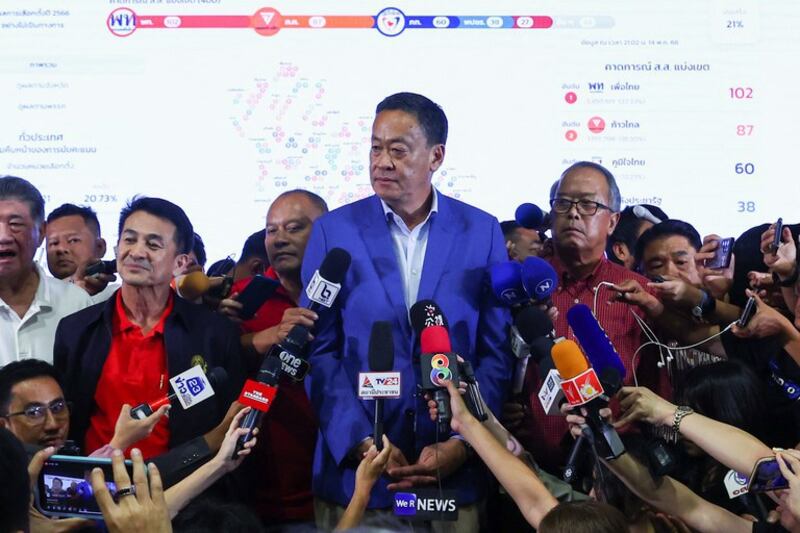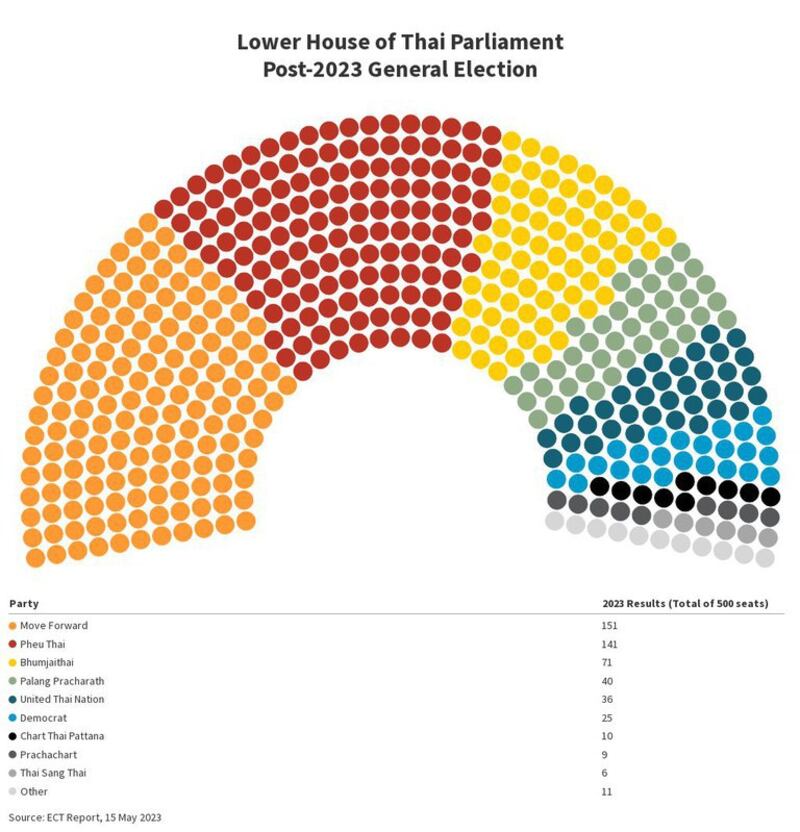After three months of political stasis following the May general election, Thailand’s parliament is expected to elect a government led by Srettha Thavisin of the Pheu Thai Party.
While establishing a new government could calm financial markets after months of uncertainty, it’s not going to calm political tensions in the country.
The Move Forward Party, which won the most seats in the May 14 polls (151), was unable to win Senate support for its coalition government.
Pheu Thai tried to form its own coalition that excluded the “Two Uncles” parties, Palang Pracharath and United Thai Nation, fronted by the 2014 coup leaders Prawit Wongsuwon and Prayuth Chan-o-cha.
With only 238 seats, Pheu Thai fell short of a majority in the lower house. Still, for a minority of senators, the jettisoning of Move Forward from the coalition and the pledge to not amend Article 112 – the draconian Lèse-Majesté law – was sufficient for their vote. Some were concerned about thwarting the will of the people, for fear of provoking street violence and roiling financial markets.
But the job of the Senate is not to endorse the people's will but to protect the interests of the conservative royalist-military elites and thwart political reform. As such, they withheld support, forcing Pheu Thai to invite the "Uncles" parties into the coalition.
With the inclusion of Palang Pracharath (40) and United Thai Nation (36), the coalition had 314 of the 500 House votes and almost certain majority support in the upper house Senate to reach the needed 375-vote threshold to form a government.
On Tuesday, Move Forward announced it would not support the Pheu Thai candidate because, it said, the new coalition would be going against the will of the people, making a Pheu Thai coalition with the conservatives inevitable.
The coalition with Pheu Thai is the best-case scenario for the conservative royalist elites. The military-backed parties were humiliated at the polls and yet they have a seat at the table and a powerful position to thwart any public policy they deem not to be in the national interest.
Although Pheu Thai has pledged that neither Prawit or Prayuth would have a cabinet position, that is far from certain. Giddy at the opportunity to be back in government, Palang Pracharath announced that it would support the government en bloc.

Some senators have indicated they still will not endorse the government and are wondering why they stopped with Move Forward. They have it within their power to establish a minority government that excludes both Move Forward and their traditional nemesis Pheu Thai.
The majority of the Senate seems to understand that a minority government, while possible, would lead to mass political unrest and would be unable to pass anything in Parliament, including the budget.
No longer a progressive party
There are three big questions to consider.
First, is this a smart move for Pheu Thai?
This fulfills leaders’ ambitions. They believe Pheu Thai is entitled to rule.
This gives the party a clear majority government and the prime minister’s office, but that short-term gain comes at its long-term political interests.
Rank-and-file members, in particular the Red Shirts, are clearly enraged that they are getting into bed with the leaders of the 2014 coup. Pheu Thai can no longer claim that it is a progressive party.
People are already making comparisons to the Democrat Party, which went from being the second largest party to near political irrelevance after getting in bed with the military in 2008. Voters have never forgiven them.
There are already concerns that some 25 Pheu Thai MPs, led by Chaturon Chaisang, could defect to the Move Forward in protest. They have denied this, but there is clearly discomfort with the inclusion of the “Uncles” parties.
The Pheu Thai leadership is calculating that they will deliver enough to their constituents in the meantime so that their supporters will not defect to Move Forward, the new standard bearer of political opposition to military and royalist elites.
Another way leadership would try to ameliorate dissatisfaction among teh party's supporters is by negotiating a grand bargain for Thaksin Shinawatra's return.
Thaksin is a fugitive, having been sentenced to 12 years in four different trials. He has lived overseas for 15 years.
He announced he would return on Aug. 10, but postponed his arrival on “health grounds.” It was clear that the delay in forming a government was the determining factor.
If all goes to plan now that a national unity government is being formed, Thaksin will be arrested at the airport upon his arrival and appeal for a royal pardon after 24 hours of incarceration.

Second question: What happens to Move Forward?
Move Forward has proven itself as an adroit opposition party. Members will bide their time as the standard bearer for political reform, poaching Pheu Thai voters. Members have already filed 10 bills in keeping to their legislative principles and campaign pledges.
The bigger question is whether the party will continue to exist and whether party leader Pita Limjaroenrat and other executives will survive politically.
In addition to an investigation into media company shares, Pita and Move Forward face investigations and criminal complaints in both the courts and the Election Commission. This includes charges of violating Lèse-Majesté by proposing to amend Article 112 that allows the strict law against royal defamation.
Like Future Forward in 2019, Move Forward could be dissolved, though it would quickly become a new party. Pita is looking at possible jail time, but more likely a 10-year ban on political activities.
This leads to the third and final question: Will any of this bring about political unrest?
If the conservatives quickly move to disband Move Forward or arrest Pita, then the potential for demonstrations, especially in Bangkok, which the party swept, is high. But the conservative elites are likely to clip Pita and Move Forward in a more gradual fashion, eliciting less public backlash.
While much of this is a recipe for political violence, street demonstrations have so far been small and short-lived. Many of the most prominent activists are either in jail or out on bail and constrained. The new leaders are less well known and charismatic.
Conservatives used the legal tools at their disposal to thwart the will of the people. They lose one of those tools next May, when the term of the senators expires.
For now, they will use their leveraged seat in the government to shape public policy and keep the Pheu Thai government of Srettha Thavisin in check.
Zachary Abuza is a professor at the National War College in Washington and an adjunct at Georgetown University. The views expressed here are his own and do not reflect the position of the U.S. Department of Defense, the National War College, Georgetown University or Radio Free Asia.
